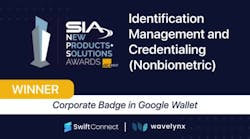MIAMI, FL - Smart Card Alliance Fall Annual Conference -- From identifying 15 million federal agency employees to responding to emergencies like Katrina to more efficient healthcare administration, smart cards bring trust and privacy to identity management and credentialing, a gathering of executives told attendees on the second day of the 13th annual Alliance conference.
Highlights
Craig Wilson, speaking on behalf of the Department of Homeland Security's First Responder Program gave some real life examples of emergency response scenarios where trained personnel were hindered due to a lack of a common identity trust between federal, state, and local authorities. The common trusted identity smart card currently being implemented across the U.S. federal government directly addresses this issue. The DHS First Responder Program plans to issue credentials to first responders so that the identity card they use in their daily routine can become their crisis identity card when needed. The ID credentials will be consistent with the new federal government standards that call for smart card technology.
Mauricio Coehlo, director for the Public Key Infrastructure of Information Technology National Institute -- a federal agency linked to the Presidency of the Republic of Brazil -- shared details on one of the largest electronic government digital credential programs using smart cards and tokens in Latin America. This national program will provide digital identity credentials to individuals and corporations in order to file electronically signed documents. A new law sets standards for digital signatures recognized by the Brazilian government. The goal of the program is to address the Brazilian government's problems of handling millions of paper forms using Internet-based services. Coehlo said one of the main challenges for implementing such a broad system is interoperability.
Michael Butler, director, Access Card Office, Department of Defense and chairman of the Interagency Advisory Board, seconded that opinion. Speaking on the Federal Issuer's Experience panel, Butler expressed the government's need to ensure interoperability of identity credentials, and described the DOD's conformance testing program to ensure that all cards work with all readers at DOD facilities.
Tony Cieri, a consultant on HSPD 12 to the IAB, appealed to the industry to speak out about the need to continue moving forward in the implementation of government smart cards, despite some uncertainty on the final end point standards. "The card is only a minor part of the total system," said Cieri. "It is the system that uses the cards where the greatest challenge exists -- yet we are stuck on focusing on the card." Cieri expressed concern that by waiting until 2006 to issue cards, it could be another two years for the authentication system behind the card to evolve before fully realizing the benefits of HSPD 12.
Frank Avignone, vice president business development for Healthmeans, Inc and co-chair of the Alliance's Healthcare Industry Council, raised awareness of the uses of smart cards in healthcare. He cited examples of efficiencies that can be gained in the processing of patient records and insurance claims using smart cards. One example: A doctor who implemented a smart card system reduced the number of separate patient processing steps for office visit medical records from 40 separate steps to 7, saving countless hours of paperwork handling and reducing potential errors.
Membership growth in the Alliance was more than 40% over the last 14 months, Smart Card Alliance Executive Director Randy Vanderhoof told attendees in his annual report to the members. He cited interest in the Alliance's new industry councils and expansion into Latin America as factors fueling that growth. Cathy Medich, task force chair, reported that over 200 individuals from more than 100 member organizations have been involved in recent task force and council activities. Linda Santucci, international trade specialist for the Department of Commerce, Commercial Services organization, explained the many programs offered by the U.S. commercial services organization to assist U.S. organizations in marketing products and services to Latin America.
Mary Mitchell, deputy associate administrator, General Service Administration (GSA) Office of Governmentwide Policy, described the GSA's efforts to help agencies move to FIPS 201 compliance on the mandated timelines. The Alliance presented the GSA Office of Governmentwide Policy with an Innovation Award for being at the center of the government smart card procurement services, its work through its Federal Smart Card Project Managers Group, and being a supporter of forming alliances between government and the smart card industry.
The Transportation Council, Contactless Payments Council and Physical Access Council of the Alliance met in separate sessions to discuss current projects and plan new activities.

